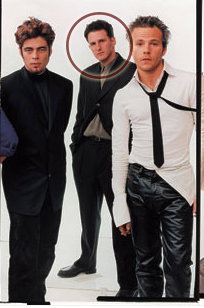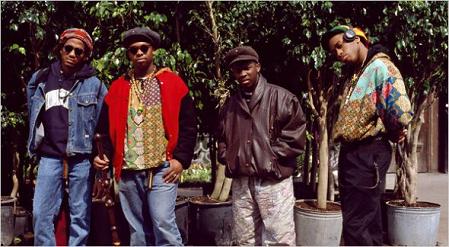 Paolo here again. Referring to the question above I wonder if any of the readers here have seen Beats, Rhymes and Life in the few big cities where it's already on.
Paolo here again. Referring to the question above I wonder if any of the readers here have seen Beats, Rhymes and Life in the few big cities where it's already on.
It's strange how, in watching this documentary about the hip hop group A Tribe Called Quest, I realized I knew less about them and more about the film's director Michael Rappaport. He of course is in True Romance and eventually ended up in one of those yearly Vanity Fair photo shoots where they name the next batch of great actors. You might remember him from "The War at Home," a passable sitcom. He also happens to be a guy from Brooklyn who grew up as part of the first hip hop generation.
What I knew about ATCQ was more about mixing them up with De La Soul, or their reluctant front man of a rapper Q-Tip. He released a song called "Vivrant Thing," which had more in common with flashy club music of the late 90's than the conscious hip hop he created with the disbanded group a decade or so earlier.
Rappaport and his editors Lenny Messina and AJ Schnack spent three years to find and compress a lot of material about ATCQ. The film tackles their origins - the group's four members are childhood friends. Q-Tip revisits his high school and reminisce about banging on his classroom tables the same way kids in my high school did. We also see him at the studio sifting through his old vinyls, admitting to being a fan of 1970's jazz and disco chanteuses.

Along with the band the film also covers the hip hop scene in the late 80's and early 90's, the obscure rap super groups that also included Queen Latifah, the 'questionable types of shit' that they were wearing that was borderline Afro-androgynous. In depicting the story Rappaport find a consistent tone, energetic, idyllic, and sometimes takes its time like romantic whispers. There's even a boyhood nostalgia in the film's depiction of hip hop back then, as earlier scenes include stills of hip hop heads depicted in a mix of black and white and colour animation. A radio dial turns, a record spins, a DJ's hands move back and forth.
I also respect how each part of their story is introduced seamlessly, like the brief and slightly humorous member Phife Dawg's declaration of himself as the funky diabetic eventually going to his addiction to sugar, his waning energy contrasting ATCQ's rising fame, eventually leading to emotional stresses that would bitterly divide the group. The audience can connect those lines but Rappaport doesn't do it for us. The group reluctantly reunites for an American tour in 2008, which all members agreed on to fund Phife's medical treatments. The feud between Phife and Q-Tip still has effects on that tour. At one point Q-Tip calling Phife a gay slur while referring to the latter's emotional volatility. But I guess people say stuff they don't mean when they're angry, even towards their childhood friends. Despite the jarring reactions to the way they treat each other, these last scenes never truly bring the film down or make the group's dissolution its main focus.